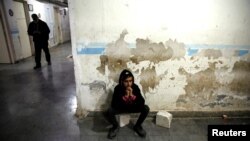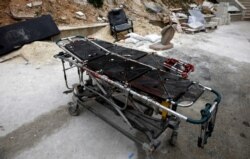The World Health Organization says tens of thousands of displaced people in northwestern Syria's Idlib province are unable to get health care, because fighting has put dozens of health facilities out of commission and created shortages of medicine and medical supplies.
Nearly one million civilians are camped out near the border with Turkey under horrific conditions. Intensified shelling and airstrikes by Russian-backed Syrian forces trying to retake Idlib in northern Syria from rebel groups has sent people fleeing for their lives.
But they do not have anywhere to go. Turkey will not open its borders to them, leaving them stranded close to the area where the bombing is taking place. World Health Organization spokesman Christian Lindmeier told VOA shelter is scarce, exposing people to the harsh elements.
"Nearly 170,000 newly displaced people are estimated to be sleeping out in the open ... which has been exposing at least 100,000 children to temperatures close to zero degrees," Lindmeier said.
At least nine children reportedly have frozen to death. The WHO has delivered seven truckloads with 55 tons of medicine and medical supplies in a two-day cross-border operation from Turkey to Idlib and Aleppo.
The WHO says the supplies will provide more than 225,000 treatments to the sick, but the care that offers is far below what is needed. Since hostilities in Idlib escalated in December, Lindmeier said 84 health facilities have been forced to suspend operation. Only 31 facilities were able to relocate from the battle zone and provide services to those who have fled the bombing.
"As a result, more than 133,000 medical outpatient consultations will not take place, nearly 11,000 trauma patients are not catered to and 1,500 major surgeries will not be performed as they normally would in a cycle of four weeks," Lindmeier said.
The supplies sent to Idlib this week are being distributed to the WHO's partners working throughout Syria's northwest region.
The WHO reported a sharp rise in trauma cases and respiratory tract infections, due to poor shelter and harsh weather conditions. In addition, health workers find many people are suffering from complications of non-chronic diseases such as heart disease and diabetes, due to irregular access to medicines.





